
Poker is a card game that involves a significant amount of luck but is also a highly skill-based activity. It requires patience, concentration, and the ability to stay calm and rational in tense situations. This is not easy to do, but it’s a necessary skill for poker players to have in order to win. In addition, it helps a player improve their social skills, since the game draws people from all walks of life and backgrounds.
A player’s bankroll is an important part of their success in poker. They must set limits for both their sessions and long-term play, and then be disciplined in following them. This means avoiding tilting and refusing to make foolish bets to try to recover from bad beats. Moreover, they must commit to playing only profitable games and avoid wasting time in games that will not provide them with the best learning opportunities.
The game also teaches the importance of maintaining a healthy mental attitude. This is because it can be very stressful, particularly when the stakes are high. A good poker player must be able to remain calm under pressure, and they must be able to read their opponents accurately.
In addition, a poker player must be able to make quick decisions under pressure. Moreover, they must be able to identify and exploit their opponents’ mistakes. This is especially true when they have a strong value hand, such as pocket kings or queens. A strong value hand that is played aggressively will often win against bluffs.
Another benefit of poker is that it helps a player develop critical thinking skills, which are necessary for success in the game. In addition, it helps players learn to celebrate wins and accept losses. It also teaches them how to calculate risk, which is an important skill for life. Lastly, it helps them build self-esteem by encouraging them to achieve goals and overcome challenges.
When it comes to the rules of poker, there are a few basic ones that every player should know. These include the ante, call, and raise. The ante is the first, usually small, amount of money that all players must put up in order to be dealt in. Then, each player must decide whether to call or raise the ante. This will determine their chance of winning the hand.
Calling and raising are ways of increasing the size of the pot, which can be beneficial if you have a strong value hand. Alternatively, you can choose to fold if your opponent has a stronger hand than you.
Another way to increase your chances of winning is to play in the late position. This will give you more information about your opponents and will allow you to adjust your betting strategy accordingly. In addition, late position gives you a lot of “bluff equity,” which makes it cheap and effective to bluff with strong value hands.